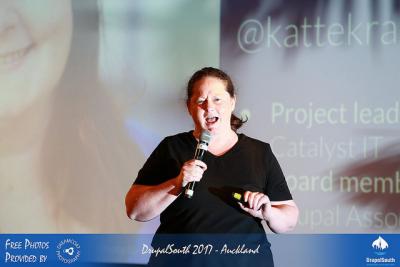Update: Video of this talk is now available.
Communication is a skill most of us practice every day.
Often without realising we're doing it.
Rarely intentionally.
I take my communication skills for granted. I'm not a brilliant communicator, not the best by any means, but probably, yes, I'm a bit above average. It wasn't until a colleague remarked on my presentation skills in particular that I remembered I'd actually been taught a thing or two about being on a stage. First as a dancer, then as a performer, and finally as a theatre director.
It's called Stagecraft. There's a lot to it, but when mastering stagecraft, you learn to know yourself. To use your very self as a tool to amplify your message. Where and how you stand, awareness of the space, of the light, of the size of the room, and of how to project your voice so all will hear you. All these facets need polish if you want your message to shine.
But you also need to learn to know your audience. Why are they there? What have they come to hear? What do they need to learn? How will they be transformed? Tuning your message to serve your audience is the real secret to giving a great presentation.
But presenting is just one of many communication skills. It's probably the one that people tell me most instils fear. Then there's writing of course. I envy writers! I would love to write more. I think of these as the "broadcast" skills. The "loud" skills. But the most important communication skill, in my view, is Listening.
As I've developed new skills as a business analyst, I've come to understand that Listening is the communication skill I need to improve most.
I was delighted to read this article by Tammy Lenski on the very morning I was to give this comms skills talk at DrupalSouth. Tammy refers to 5 Types of Listening identified in a talk given by Stephen Covey some years back. She says
"He described a listening continuum that runs from ignoring all the way over on the left, to pretend listening (patronizing), then selective listening, then attentive listening, and finally to empathic listening on the right."

I think this is really useful. If we are to get better at listening, we need to study it. But more importantly, we need to practice it. "Practice makes perfect". Kathy Sierra talks a lot about the power of intentional practice in her book Badass: Making Users Awesome
So, communication is a huge, huge topic to try and cover in a conference talk, so I tried to distil it down into three elements.
The what.
The how,
and The why.
The what is the message itself. The how is the channel, the method, the style, or the medium, as Marshall Mcluhan said, and finally, there's the why; the intent, the purpose, or the reason for communicating. I believe we need to understand the "why" of what we're saying, or hearing if it is to be of any benefit.
Here's my slides:

